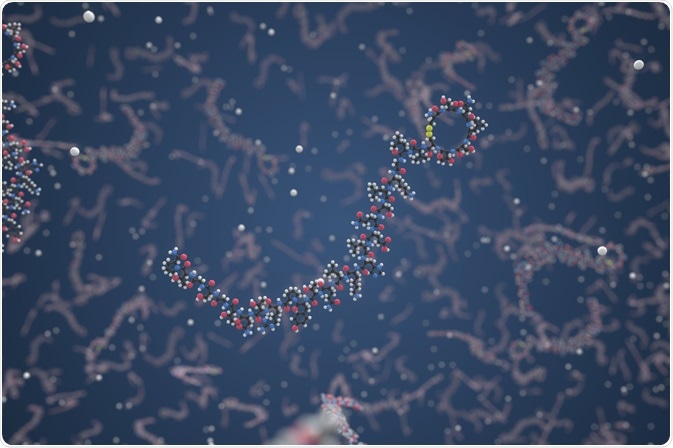Calcitonin, which is also known as thyrocalcitonin, is a protein hormone that, in humans and other mammals, is mainly secreted by the parafollicular cells (C cells) of the thyroid gland.

Image Credit: Irina Anosova / Shutterstock.com
In humans, calcitonin is made up of 32 amino acids. In nonmammalian animals such as fish and birds, calcitonin is secreted by cells in the glandular ultimobranchial bodies.
Actions of calcitonin
The main actions of calcitonin are to increase bone calcium content and decrease the blood calcium level when it rises above normal. Calcitonin also lowers blood phosphorus levels when they rise above normal.
Calcitonin and bones
Calcitonin opposes the effects of parathyroid hormone (PTH), which acts to increase the blood level of calcium. PTH achieves this through several actions involving the bones, kidneys, and intestines. Within the bones, for example, PTH stimulates the release of calcium, which increases bone destruction and decreases the formation of new bone.
Calcitonin prevents calcium loss from bones, which is particularly important in conditions that tend to lead to calcium loss such as pregnancy or being immobilized for a prolonged period due to a fracture or heart attack. The loss of calcium from the bones can make them brittle, fragile, and prone to fracture.
Calcitonin also suppresses the activity of cells in the bone called osteoclasts. Osteoclasts dissolve bone tissue, which is replaced by new tissue formed by cells called osteoblasts. Calcitonin acts on receptors present on the surface of osteoclasts to stop them from breaking down bone.
Under the microscope, the binding of calcitonin to these receptors appears to cause the osteoclasts to lose their “ruffled border,” which refers to the compactly folded cell membrane that aids bone removal by increasing the cell’s surface area for resorption.
Calcitonin action in the intestines
PTH also increases the amount of calcium absorbed from food in the intestine via its effects on vitamin D metabolism. In an effort to help maintain a normal level of blood calcium, calcitonin prevents calcium levels from rising above normal after a meal. By acting in an opposing way of PTH, calcitonin prevents calcium levels from rising by limiting the absorption of calcium from the intestine.
In some mammals, calcitonin appears to play a role in hunger and satiety.
Calcitonin and kidneys
PTH also lowers the amount of calcium lost in the urine and stimulates active vitamin D production in the kidneys. Therefore, calcitonin plays a role in maintaining normal blood levels of vitamin D.
Calcitonin also regulates the level of calcium and other mineral levels in the kidneys. To this end, this protein prevents the reabsorption of phosphate by the kidney and increases the kidney’s reabsorption of calcium and magnesium, thus leading to increased calcium excretion via the urine.
Therapeutic indications
The rate of bone loss is accelerated in post-menopausal women and in those with osteoporosis, where thinning of the bone arises due to decreased bone formation or increased bone resorption. In these affected populations, calcitonin has been shown to improve the density and strength of bone.
Additional examples of conditions that are treated using calcitonin include Paget’s disease of the bone and hypercalcemia, which is chronically high blood calcium levels.
Paget’s disease leads to an accelerated and disorderly remodeling of the bone, which causes the bones to become painful and weak. Calcitonin reduces bone turnover in these patients. Therefore, in 1991, an intranasal calcitonin spray was approved by the United States Food and Drug Administration (FDA) for the treatment of this condition.
Both increased calcitonin secretion and activity levels are only sustained for a few days; therefore, patients with hypercalcemia do not have a high serum level of calcitonin.
Pathologic conditions involving calcitonin
In patients with medullary thyroid carcinoma, on the other hand, cancerous C cells secrete large amounts of calcitonin. These patients have a high level of serum calcitonin but a normal level of serum calcium.
Other conditions where the calcitonin concentration may also be increased include lung cancer and some pancreatic tumors. More specifically, these pancreatic tumors include an insulinoma, which is a tumor that secretes insulin, as well as a vasoactive intestinal polypeptide-secreting tumor, otherwise known as VIPoma.
References
Further Reading
Last Updated: Nov 28, 2022